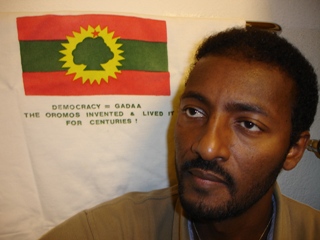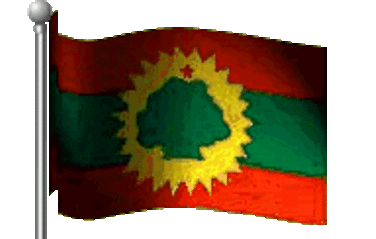Fear of torture or ill-treatment in Oromia
Detention without charge / fear of torture or ill-treatment
August 30 2006 UA 233/06 Detention without charge / fear of torture or ill-treatment
ETHIOPIA
Belama Nigga (m)
Chale Nigga (f)
Gaddise Dagafa (f)
Imabet Taressa (f) High School students
Tadalu Nigga (f)
Tafarra Galasaa (m)
Zannu Nigga (f)
Irena Iticha (m), Oromo National Congress member of parliament Dejene Chimdi (m)At least two people aged over 70Other civilians from the Tukur Inchinni district, Oromia region.
Over 250 civilians, including those named above, from the Tukur Inchinni district of the Oromia region, have apparently been arbitrarily arrested by the Ethiopian government in recent days. Among those arrested are several high school students and at least two elderly people over the age of 70, as well as Irena Iticha, a member of parliament for the opposition Oromo National Congress. They are at risk of torture or ill-treatment.
The detainees are being held at three locations: Sankele Police Training Centre, Ormat Military site and Ambo Police Station. To Amnesty International's knowledge, none of those arrested has been charged and most, particularly those held at Sankele and Ormat, have been denied access to relatives and legal assistance.
The arrests reportedly occurred after students and other civilians protested against the Ethiopian government?s programme of redistribution land to members of the Ethiopian ruling party, the Ethiopian People's Revolutionary Democratic Front (EPRDF). However, it is feared that the detainees are being targeted because they are members of the Oromo ethnic group. The group has suffered a pattern of human rights abuses at the hands of the authorities.
BACKGROUND INFORMATION
The Ethiopian government has been engaged in an ongoing conflict with the Oromo Liberation Front (OLF) and there have been several incidents in the Oromia region over the past two years which have led to arrests, detentions and sometimes killings and torture.
In January 2004, over 100 people were detained at a demonstration organized by the Mecha Tulema Association, a long-established Oromo welfare organization. Eight Oromo students at Addis Ababa University were also arrested for criticizing the Oromo regional government at a student cultural event on 18 January. Some 300 other students who demonstrated for their release were also arrested on campus. While in detention they were reportedly beaten and subjected to other inhuman treatment. Most were released without charge after a few days. The university administration suspended most of the affected students and later expelled others.
In May 2004 police arrested three leading officials of the Mecha Tulema Association, including its president. They and 24others, including several university students arrested in January, were charged with armed conspiracy and membership of the OLF. The three were released on bail in November but were re-arrested in February and remained in prison throughout 2005.
In August 2004, more than 300 people were arrested in Agaro town in western Oromiya.
Most were released in October but some were charged. It was alleged that detainees were tortured and that some "disappeared." Some were believed to be held in secret detention centres.
In November and December 2005, following demonstrations which were largely peaceful, several thousand students and others were detained incommunicado without charge or trial. A few thousand are still believed to be held in different prisons and police stations, with only a few so far brought to court and charged. Several demonstrators were reportedly shot dead by the security forces, and many were allegedly tortured or ill-treated, particularly in Ambo palace prison and Sankele police camp
In January 2006, further anti-government protests led to the arrest of several thousands students. Several demonstrators were also reportedly shot dead and others wounded by the security forces. Many protesters were beaten by police. Some detainees were released, but the whereabouts of many of the others, some taken to remote rural prisons, are not known.
RECOMMENDED ACTION: Please send appeals to arrive as quickly as possible, in English or your own language expressing concern at the detention of over 250 members of the Oromo ethnic group since 22 August; expressing particular concern for the safety and wellbeing of a number of high school students, and at least two people aged over 70, who are among the detainees;- requesting details of the charges being faced by the detainees; appealing for them to be taken before a court within 48 hours, as prescribed under Ethiopian law, and either charged or released; calling for them to be given immediate access to their families, legal counsel and any medical care they may require; calling on the authorities to guarantee that none of the detainees shall be subjected to torture or ill-treatment.
APPEALS TO:-Prime MinisterHis Excellency Meles Zenawi,
Office of the Prime Minister,
PO Box 1031, Addis Ababa,
Ethiopia
Fax: + 251 11 1552020 / 1552030 (please keep trying)Salutation.
Your Excellency Minister of Justice Mr Assefa Kesito,
Ministry of Justice,
PO Box 1370, Addis Ababa,
Ethiopia
Fax: + 251 11 5517775 / 5520874
Email: ministry-justice@telecom.net.et Salutation.
Dear Minister
COPIES TO:President of Oromia Region Mr Minassie Woldegiorgis
Oromia Region State Council
P O Box 101769 Addis Ababa,
Ethiopiaand
To diplomatic representatives of Ethiopia accredited to your country
PLEASE SEND APPEALS IMMEDIATELY. Check with the International Secretariat, or your section office, if sending appeals after 11 October 2006
Nazret.com



0 Comments:
Post a Comment
<< Home